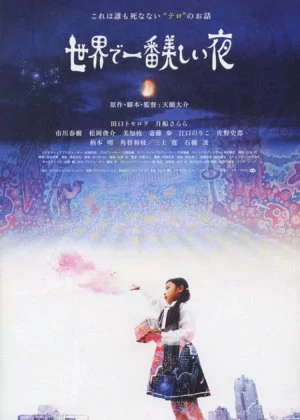The Most Beautiful Night in the World

Daisuke Tengan's The Most Beautiful Night In The World [Sekai De Ichiban Utsukushi Yoru] is one of those typical Japan-only films. A certain breed of absurd comedy and down-to-earth drama that no other country seems to be able to produce. It's a rather lengthy film that demands a little effort from its audience, but Tengan keeps a tight grip on the script and does everything in his power to make it worth your while.

Even though Daisuke Tengan isn't too famous a director, he's quite notorious for writing a couple of well-known screenplays. He penned 13 Assassins, Audition and Imprint for Takashi Miike and wrote the screenplay for Shohei Imamura's The Eel and Dr Akagi. Tengan doesn't shun the absurd and as a director he is able to fully explore the weirdness in his writing. It may not be as all-out insane as Miike's most infamous films, but be sure to run into some very odd twists and turns along the way.
Tengan's Sekai reminded me a little of Nakashima's Memories Of Matsuko. On the surface you'll find a bright and fun film, but underlying all the joy is an unmistakable undercurrent of darkness. When all is said and done Sekai is a true comedy though, only using the darker segments as a diversion rather than the other way around. The finale in particular is one of the most effective feel-good moments I've encountered in a long, long time.
The film starts with the arrival of Kazuya in Kaname, a rather backwards and rural village in Japan. Kazuya was forced to join the local Kaname newspaper, which functions as a refuge for journalists who fucked up their career in Tokyo. Bored out of his wits, Kazuya starts wandering around town in the hope that there is something interesting to report about. It doesn't take him long to realize that this village has its own share of secrets, but uncovering them is a lot harder than he expected.

The mix of playful, absurd comedy and drama is perfectly reflected in the film's visual style. There are several sequences setting the actors to collage-like animated backgrounds, mostly to reveal some background story or just helping out with parts that would've been pretty difficult to film in real life. It's a pretty smart way to avoid sketchy CG while at the same time giving the film its own unique identity. The dramatic sequences are more traditional, sporting solid camera work and slightly murkier colors.
The soundtrack is a collection of up-beat and fun background tracks mixed with local folk, at times vaguely reminiscent of a typical Wes Anderson soundtrack. It's not a truly great or memorable selection of tracks, but it does help to give the film it's own particular atmosphere while further strengthening that typical backwards town feeling. The soundtrack doesn't make a lasting impression, but it does work very well within the confines of the film.
Taking up the lead role is Tomorow Taguchi (of Tetsuo fame). One of Japan's most under-appreciated actors, he has a keen eye for interesting films (with notable appearances in Hiroki Ryuichi's films like M, It's Only Talk and Keibetsu) and has been working hard on his career these past couple of years. The secondary roles are equally capable, with Tsukifune and Ryo Ishibashi in strong supporting roles and Yoshiyuki Morishita in another great cameo. All in all a very strong cast that knows how to work around the weirdness while building up a set of earnest, believable characters.

Tengan's Sekai is the kind of film that throws the notion of suspension of disbelieve completely out of the window.By deemphasizing the weirdness Tengan creates a very unique and wonderful universe without losing too much time trying to explain everything. When halfway through the film Kazuya turns into a snake it is simply announced by a short voice over monologue. From that point on the film just seems to accept this weird turn of events and the audience is asked to do the same.
Even though the film isn't overly erotic, do take note that sexuality is the film's core theme and it goes together with a rather surprising amount of nudity. Never in a very erotic setting, but this is definitely nsfw material, even when the film in its entirety plays like a sweet, subtle and feel-good piece of comedy. It's nothing to worry about really, unless you're a prude who doesn't take this kind of nudity very well.
Tengan's Sekia is a little gem. While at first the different segments of the film may appear to be a bit detached, the second half of the film does an excellent job of bringing everything together into an amazingly feel-good finale. Don't expect to make sense of everything happening in the film, just accept Tengan's universe as it passes you by and enjoy the wonders that stem from it. With 160 minutes it's a pretty long film, but the investment is more than worth it.